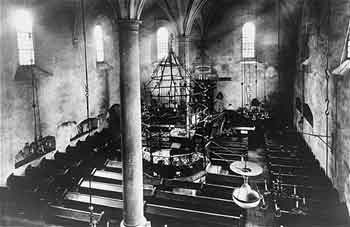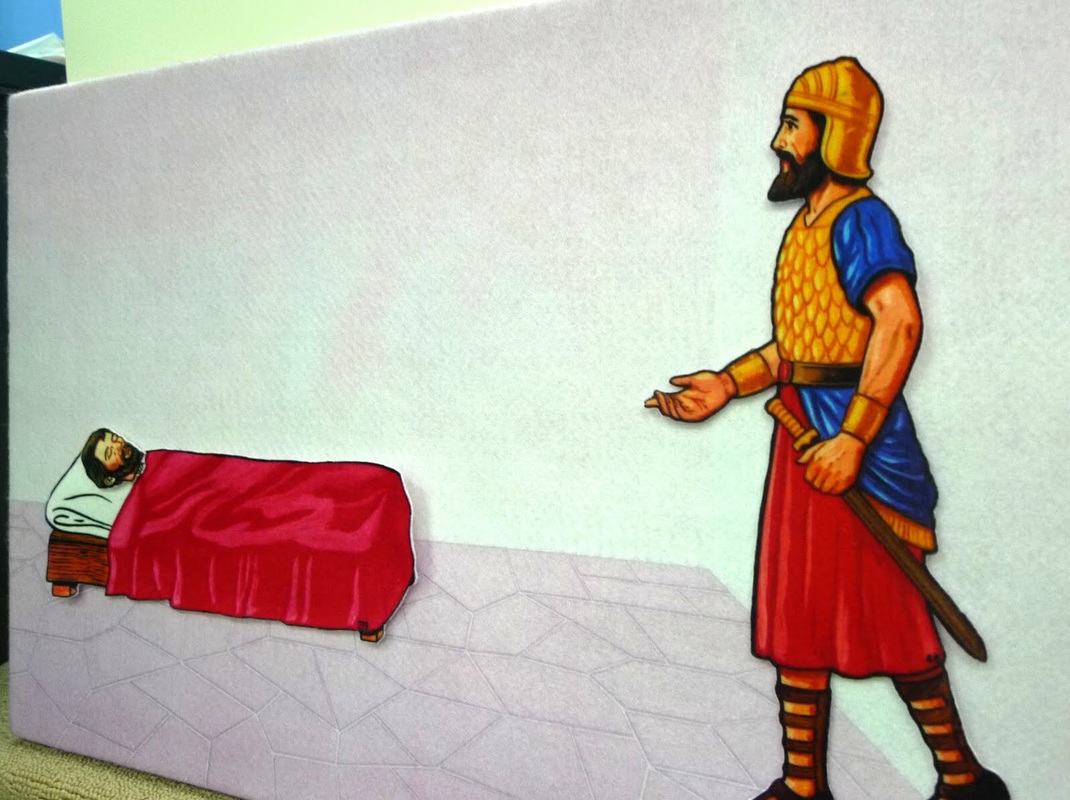3 When the centurion heard about [Yeshua], he sent some [Judahite] elders to Him, requesting Him to come and save the life of his slave. So this Roman centurion heard about Yeshua of Nazareth and decided that he would send to Yeshua some of his friends who were elders in the nation of Judah. He probably reasoned, "Yeshua is from Judah. He'll listen to these elders." Notice again (as I mentioned in the last post), this centurion loved his slave. He wanted his life saved, physically.
The elders got to Yeshua and pretty much begged him to come and heal the slave of the centurion. Verses 4-5 tell us at least two reasons (probably one, branching out to two) that they felt the centurion was worthy for his slave to be healed. 1. He loves our nation 2. He built us a synagogue We aren't specifically told if the centurion did any of the actual building (as in carpentry or stone work with his hands) or if he paid for the synagogue to be built. Either way (the latter is more likely) he was responsible for one of their synagogues. The elders of Judah looked up to this centurion because he thought enough of their nation (he obviously was not a Judahite) to build them a synagogue. I can't tell you how many times I've heard something like this: "The church isn't the building, it's the people." I used to think that was a pretty good cliche. I've come to believe that it's not really that good at all. I'm not saying that the people aren't important; they are. But I'm also not going the say the building is not important; it is. At least if you believe Luke 7:5. You can read through the New Testament, and you can find where people met in their homes for worship. Sure, that's acceptable, but please don't pit one set of verses against another set of verses. There are numerous verses that speak of the first century synagogue, a special place, a special building, dedicated for the purpose of worshiping the Father on new moons and sabbaths. It is healthy to have a place that is set apart for worship. A place different than where you hang out the other days of the week. A place that is holy, so to speak, in the sense of set apart. There's a sense of awe about it. A good awe, not an idolatrous awe. The Old Testament tabernacle is certainly not the New Testament synagogue, but in studying about the tabernacle, the building, we see that Yahweh was very particular about a special place, and special "pods" within that place, where He was to be approached. I think that having a place, building a synagogue (like the centurion did for the nation of Judah) is a good thing to do. It's not something to be discarded with a cliche like, "The church is the people, NOT the building." No, the church is the people AND the building. This doesn't mean people cannot meet under an oak tree or in a living room. It just means that we recognize that if we have the ability, the route to take is to have a designated place of worship where our families can "escape the world" for a while and come before the King. ~ Matthew
0 Comments
Luke 7:1-2 HCSB I'll soon be teaching through Luke chapter 7. I started teaching through this gospel a few years ago and have made it all the way through chapter 6. Chapter 6 changed my life, specifically verse 20 to the end of the chapter.
I've been reading Luke 7 for quite some time now in preparation for my teaching, and I've decided to get a jump start on the text by chronicling my thoughts here. So this will be the "Matthew Janzen Commentary on Luke 7" I guess. Verse 1 has Yeshua concluding all of his sayings recorded in Luke 6:20 onward. He then enters the city of Capernaum, or as it was known then, Kafar-Nahum, meaning "Village of Comfort." I've got a friend of mine that has taken a few lengthy trips to Israel; he, his wife, and seven children. I remember him telling me a story about a fellow there, I believe it was some sort of guide, sharing about a city, the city of Kafar-Nahum. My friend told this guide that he'd never heard of that city or seen it in Scripture. Little did my friend know that the city he was accustom to calling Capernaum was nothing but a butchering of the actual Hebrew name Kafar-Nahum. So Yeshua enters this city, a city in the area of Palestine, and Luke tells us of this slave of a centurion. A centurion was a Roman officer that had about 100 men under his authority. Centurions were themselves under authority (as we will later see in this section), but were nonetheless the authority themselves over 100 soldiers. The main point I want to focus on in Luke 7:1-2 is the fact that this centurion had what the verse calls a slave. We hear the word slave today and all kinds of thoughts pop into our head. We think of harsh slavery, civil rights, we may even wander back to the exodus of the Israelites from their slavery to the Egyptian taskmasters. But here, we see that this slave of the centurion was highly valued. He was special. He was so special that the centurion wanted his sick slave to be made well. The centurion didn't want his slave to die from this sickness. I get the feeling from the verse that this wasn't because the centurion wanted to beat him to a pulp with work, but rather because the slave was loyal to his master. The slave was highly valued by his master. The master took good care of his slave. At these points in reading Scripture we must not force what we've been taught to contradict the text. Sometimes we do this subconsciously. What I mean is that we generally think of all slavery as wrong. We hear the word slavery and we think "that is terrible." It is true that slavery can be a terrible thing, but according to this verse there is a form of slavery that is quite acceptable. The centurion had a slave, a servant. This servant served his master, did it well, and was valued because of this. The servant was taken care of, housed, fed, and treated with respect himself. He wasn't on the same level of authority as the centurion, but he still was a respected slave. Nothing negative is said about this relationship. If we believe the Bible, we should have no problem believing what this verse implies. I think we often read through texts like these in Luke and glance over these smaller nuggets by rushing to the bigger picture in the story. There certainly is a bigger picture, but that doesn't mean the smaller snapshots are of no significance. ~ Matthew |
AuthorBlog by Matthew Janzen. Lover of Yahweh, Yeshua, my wife and 5 children. All else is commentary. Archives
December 2023
Categories
All
|


 RSS Feed
RSS Feed